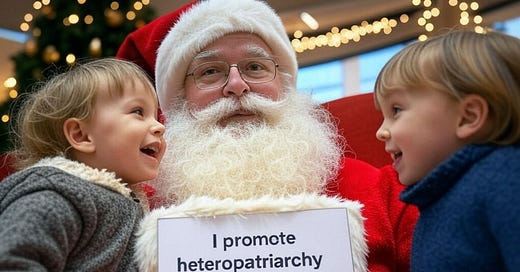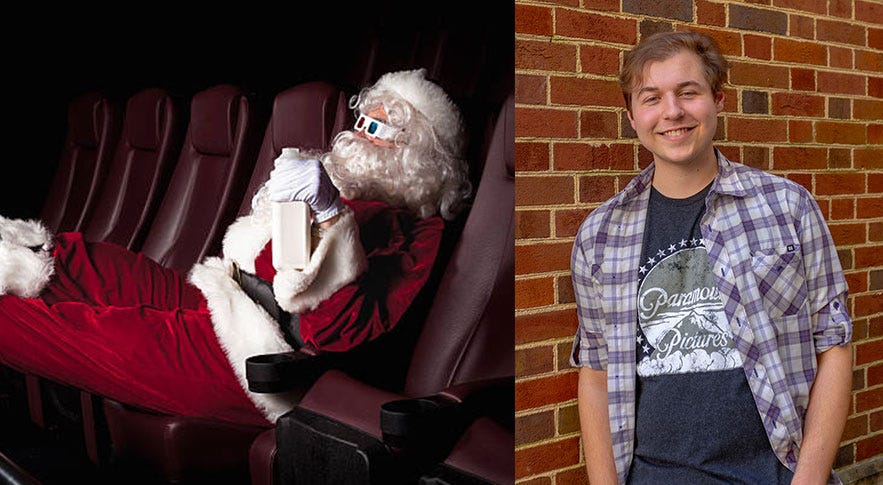STUDY: Santa movies promote “capitalism, white supremacy, and heteropatriarchy”
Mr. Rosu's essay on Santa's whiteness was hand-picked out of 4,000 student essays to win
A senior at Miami University in Ohio has won a prestigious award after writing a thesis last summer about Santa’s whiteness and heteronormativity in films.
The student — Ryan Rosu — is one of about 4,100 seniors in his graduating class. Out of all those seniors, Miami University officials choose five seniors annually to win the exclusive Libraries’ Award for Undergraduate Research Excellence (LAURE) for their research, a $1,500 award, and eternal bragging rights.
Ryan Rosu’s winning essay was titled “Countering the Dominant Ideology of the Christmas Movie Genre” in which he claimed that Christmas films “uphold a conservative ideology that uses the device of nostalgia to uphold the values of 1950s America.”
Citing films such as The Happiest Season (2020), Holiday Heart (2000), and others, Rosu argues that there is a lack of diversity, race, gender, and sexuality in most Christmas films with Santa Claus.
“Whiteness is established as the norm within the Christmas movie, pushing people of color to the margins if not outright villainizing them. This can also be said to be true of Santa Claus himself, who represents… a normative whiteness – the Caucasian appearance, white hair and beard, white fur trim – and reassuring masculinity,” Rosu argued.
Rosu also contends that Christmas movies subjugate women and promote patriarchy. Notably, Mrs. Claus and Rudolph are seen as subservient in an academic feminist lens, considering Santa’s patriarchal presence.
“As with class and race, the Christmas genre’s ideal family model is that of the nuclear family, with a strong patriarchal figure and a subservient wife who is the mother of the children. The father is the breadwinner, while the mother cooks and takes care of the children. This is true especially of Santa Claus, whose wife is almost never given a first name,” Rosu writes in his award winning essay.
“In this way, the Christmas movie pushes the notion of heterosexual marriage as essential to the family structure, and thus the perfect Christmas.”
Further, he argues that Christmas movies are merely a Trojan horse for American conservatism, an “extremely problematic view,” he says, because these movies are often perennial fixtures in American culture.
“As a whole, the Christmas genre is a yearly phenomenon that, by and large, promotes a conservative ideology that, despite its month-long grip on culture, has gone unexamined from a critical lens… which reflects a fundamental support of capitalism, white supremacy, and heteropatriarchy within the genre.”
“Though no film has completely turned the ideology on its head, some films have used these tools to make Christmas movies that do not serve to reinforce the dominant ideology of the genre,” he concludes.
“If more movies like these are released, the future of the genre may be one that presents a vision of Christmas that appeals to all Americans, not just a privileged few.”
According to the school newspaper, Ryan Rosu was mentored by UM faculty and librarians in his research. It’s quite unusual to see a male academic, especially one that isn’t majoring in women’s studies, to write about issues of race, gender and sexuality in film.
Notably, Rosu did not cite any feminists, but his Goodreads account indicates an interest in the feminist academic Judith Butler, as well as Toni Morrison, Franz Fanon, and an author known to many members of Students For Justice in Palestine as the grandfather of Palestine activism, Edward Said.
Toni Airaksinen is a journalist in Delray Beach, Florida. Follow her Substack, Instagram, or on X, where she frequently tweets. Buy her a coffee here.







Thanks for the picture. It's always good to put a visual alongside the word asshole.
Yikes!